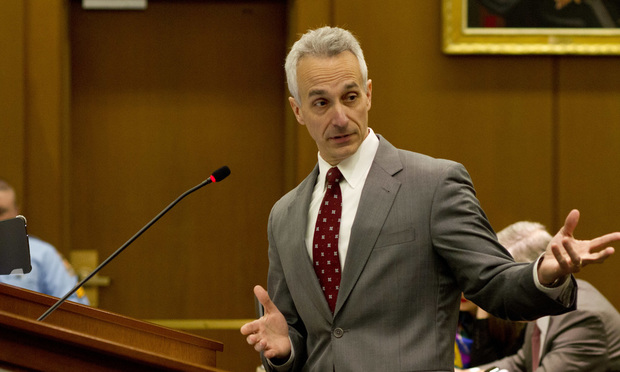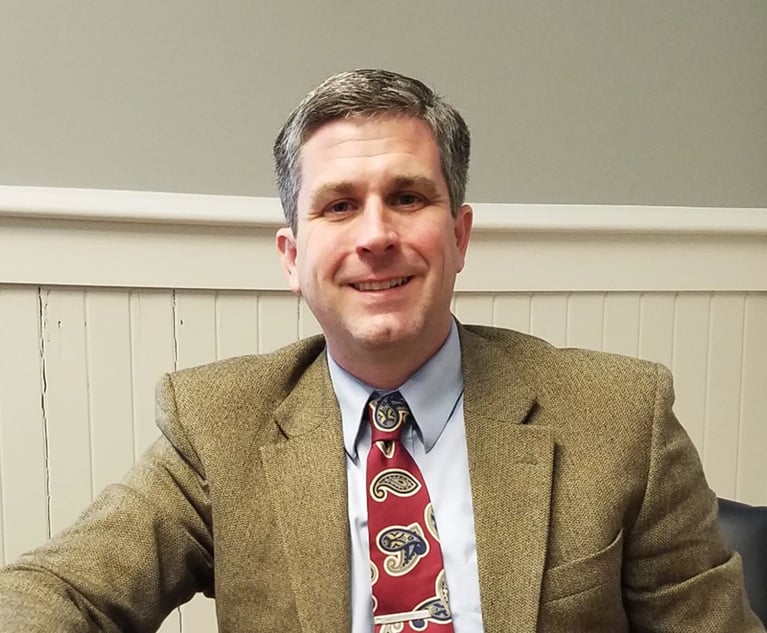'Fundamentally Unfair': Geico Challenges $2.1M Judgment in Suit It Didn't Know About
Geico's lawyer pushed back against the default judgment in front of the Eleventh Circuit Court of Appeals, arguing that the insurer had no knowledge of the case.
December 13, 2019 at 04:10 PM
7 minute read
 Frank Lowrey, Bondurant Mixson & Elmore. (Photo: John Disney/ALM)
Frank Lowrey, Bondurant Mixson & Elmore. (Photo: John Disney/ALM)
Lawyers for Geico argued at the Eleventh Circuit Court of Appeals Thursday that the insurer should not be on the hook for the lion's share of a more than $2.9 million default judgment against a driver who hit a bicyclist—a judgment later affirmed against the carrier by a federal jury.
Arguing for the insurer, Smith Gambrell & Russell partner Edward Wasmuth Jr. told the appellate panel that it is "fundamentally unfair" to hold Geico responsible for a massive default judgment handed down in a case it didn't even know about, which was then allowed to be the damages benchmark for a subsequent trial finding it acted in bad faith.
Although Geico told the at-fault driver shortly after the wreck that it would handle the claim and subsequently turned down an offer to settle for the $30,000 policy limit, Wasmuth said she never informed the carrier that a lawsuit had been filed.
Geico's first knowledge of the suit and default judgment—then totaling more than $2.9 million—was when the plaintiff's lawyer sent a letter after it was entered.
If the award stands, he said, it would mean that if "we send a letter that says 'we're handling this,' the insured can just throw up their hands and say 'I don't have to do anything, I don't have to cooperate … I can let it go into default, it's all good.'"
"That's a terrible rule of law, and a jury can't be allowed to say that," said Wasmith, who represents Geico with firm partner Leah Ward Sears; J. Robb Cruser and Kathleen Hurley of Cruser, Mitchell, Novitz, Sanchez, Gaston & Zimet; and Macon solo Wallace Miller III.
Bondurant Mixson & Elmore partner Frank Lowrey IV countered that Geico had made its own bed by first offering barely enough to cover the cyclist's injuries, then taking the position that the driver—who had borrowed the policyholder's truck—should have somehow known she was supposed to send the insurer a copy of any lawsuit served on her.
Geico certainly should have known that its refusal to offer more than $12,409 would likely trigger a lawsuit, Lowrey said.
That refusal was the proximate cause of the excess judgment, he said.
"If you cause your insured to default, you can't invoke that default to justify your failure to settle," said Lowry, who represents Fife Whiteside, the bankruptcy trustee for the at-fault driver.
Whiteside's team also includes Michael Terry and Timothy Rigsbee of Bondurant, and Charles Gower, Austin Gower and Miranda Brash of Columbus' Charles A. Gower P.C.
The case began in Columbus in February 2012 when a Ford pickup truck driven by Bonnie Winslett struck bicyclist Terry Guthrie.
Guthrie was taken by ambulance to a hospital, complaining of pain in his side and hip, and soon accrued about $10,000 in hospital bills.
Winslett, described in court filings as having a history of mental and substance abuse issues, had borrowed the truck from a friend, Karen Griffis, the Geico policyholder.
Winslett was cited for driving with a suspended license and failure to yield.
Guthrie's lawyer contacted Geico, which in March 2012 sent Winslett a letter saying it would "be handling this injury directly with attorney Charles Gower" and asking that she contact the insurer.
On May 5, Austin Gower sent Geico a 30-day time-limited offer to settle for its $30,000 limit.
After reviewing Guthrie's hospital bills and injuries, Geico's adjuster determined that his claim was worth between $12,409 and $15,9000, and offered the lower sum.
Geico's filings say it repeatedly tried to reach Gower to discuss a settlement but was only ever able to speak to his paralegal.
On May 29, Guthrie sued Winslett in Muscogee County Superior Court. The next day a deputy served her with a copy of the complaint, which she testified she "wadded up, threw it away, and said 'to hell with this shit.'"
She also indicated that she may have been high on drugs. She did not inform Geico that she had been sued.
On Aug.1 2012, after a hearing lasting an hour or less, Judge Bemon McBride III entered a default judgment for $2,916,204 against Winslett.
When Geico learned of the judgment it sought to have it set aside, but McBride declined to do so.
That decision was upheld by the Georgia Court of Appeals in 2013.
Guthrie filed a petition for involuntary bankruptcy against Winslett, and Whiteside was appointed trustee; he then field a bad faith action against Geico in Georgia's Middle District Court.
Following a three-day trial before Judge Clay Land, the jury found that GEICO had failed to properly respond to Guthrie's offer to settle and that the failure was the proximate cause of the default judgment against Winslett.
The verdict form included the $2.9 million award as the measure of damages, and the jury said Geico bore 70% of the liability.
In its appellate briefs and in Thursday's arguments before a panel including Judges Britt Grant, Charles Wilson and visiting Judge Jose Martinez of Florida's Southern District, Geico argued that Winslett's failure to tell it about Guthrie's suit breached its policy's provisions ad that there was thus no coverage when the default judgment was entered.
Geico also said that failure was the "intervening proximate cause" of the default judgment, and that its use as the measure of her damages in the federal suit violated Geico's due process rights.
Wasmuth had barely begun his presentation when the judges began peppering him with questions, with Wilson saying he hadn't seen any case law to support Geico's position that Winslett's failure to tell it about the lawsuit voided coverage and pointing to the jury's finding that the failure to settle was the proximate cause of the default.
Wasmuth said there would have been no default or bad faith claim if GEICO had known about the suit, and that nobody, including the plaintiff's own expert, thought Guthrie's injuries were worth anything close to $2.9 million.
Wilson asked if GEICO's position was that it would have settled for its $30,000 limit had it known that it's offer would not even have covered his medical bills, taking into account legal fees.
"We didn't know that because we never got the chance to defend the case," said Wasmuth. Lowrey said the federal jury's verdict clearly showed it felt GEICO mishandled the claim from the outset and had heard expert testimony that its first letter in response to the claim was below the standard of care.
GEICO's own policy manual instructs employees to remind policyholders about reporting any lawsuits when a claim is made, he said.
The judges noted that Guthrie's lawyers could have simply told GEICO about the lawsuit to begin with.
"Isn't it pretty bad behavior on a lawyer's part when you're in conversation with an insurer, and you don't tell them about a lawsuit?" asked Grant.
"I'm not here to endorse the behavior," said Lowrey, later acknowledging that he would be "tone-deaf if I didn't understand that there are aspects of this case you guys aren't crazy about, right? I get that.
"But what this case is about is whether these jury findings were supported by the evidence," Lowrey said. "And anything else you might not be delighted with happened in the Georgia state court system and the Georgia Court of Appeals."
This content has been archived. It is available through our partners, LexisNexis® and Bloomberg Law.
To view this content, please continue to their sites.
Not a Lexis Subscriber?
Subscribe Now
Not a Bloomberg Law Subscriber?
Subscribe Now
NOT FOR REPRINT
© 2025 ALM Global, LLC, All Rights Reserved. Request academic re-use from www.copyright.com. All other uses, submit a request to [email protected]. For more information visit Asset & Logo Licensing.
You Might Like
View All
On The Move: Squire Patton Boggs, Akerman Among Four Firms Adding Atlanta Partners
7 minute read

Justice 'Weaponization Working Group' Will Examine Officials Who Investigated Trump, US AG Bondi Says

Law Firms Mentioned
Trending Stories
- 1States Accuse Trump of Thwarting Court's Funding Restoration Order
- 2Microsoft Becomes Latest Tech Company to Face Claims of Stealing Marketing Commissions From Influencers
- 3Coral Gables Attorney Busted for Stalking Lawyer
- 4Trump's DOJ Delays Releasing Jan. 6 FBI Agents List Under Consent Order
- 5Securities Report Says That 2024 Settlements Passed a Total of $5.2B
Who Got The Work
J. Brugh Lower of Gibbons has entered an appearance for industrial equipment supplier Devco Corporation in a pending trademark infringement lawsuit. The suit, accusing the defendant of selling knock-off Graco products, was filed Dec. 18 in New Jersey District Court by Rivkin Radler on behalf of Graco Inc. and Graco Minnesota. The case, assigned to U.S. District Judge Zahid N. Quraishi, is 3:24-cv-11294, Graco Inc. et al v. Devco Corporation.
Who Got The Work
Rebecca Maller-Stein and Kent A. Yalowitz of Arnold & Porter Kaye Scholer have entered their appearances for Hanaco Venture Capital and its executives, Lior Prosor and David Frankel, in a pending securities lawsuit. The action, filed on Dec. 24 in New York Southern District Court by Zell, Aron & Co. on behalf of Goldeneye Advisors, accuses the defendants of negligently and fraudulently managing the plaintiff's $1 million investment. The case, assigned to U.S. District Judge Vernon S. Broderick, is 1:24-cv-09918, Goldeneye Advisors, LLC v. Hanaco Venture Capital, Ltd. et al.
Who Got The Work
Attorneys from A&O Shearman has stepped in as defense counsel for Toronto-Dominion Bank and other defendants in a pending securities class action. The suit, filed Dec. 11 in New York Southern District Court by Bleichmar Fonti & Auld, accuses the defendants of concealing the bank's 'pervasive' deficiencies in regards to its compliance with the Bank Secrecy Act and the quality of its anti-money laundering controls. The case, assigned to U.S. District Judge Arun Subramanian, is 1:24-cv-09445, Gonzalez v. The Toronto-Dominion Bank et al.
Who Got The Work
Crown Castle International, a Pennsylvania company providing shared communications infrastructure, has turned to Luke D. Wolf of Gordon Rees Scully Mansukhani to fend off a pending breach-of-contract lawsuit. The court action, filed Nov. 25 in Michigan Eastern District Court by Hooper Hathaway PC on behalf of The Town Residences LLC, accuses Crown Castle of failing to transfer approximately $30,000 in utility payments from T-Mobile in breach of a roof-top lease and assignment agreement. The case, assigned to U.S. District Judge Susan K. Declercq, is 2:24-cv-13131, The Town Residences LLC v. T-Mobile US, Inc. et al.
Who Got The Work
Wilfred P. Coronato and Daniel M. Schwartz of McCarter & English have stepped in as defense counsel to Electrolux Home Products Inc. in a pending product liability lawsuit. The court action, filed Nov. 26 in New York Eastern District Court by Poulos Lopiccolo PC and Nagel Rice LLP on behalf of David Stern, alleges that the defendant's refrigerators’ drawers and shelving repeatedly break and fall apart within months after purchase. The case, assigned to U.S. District Judge Joan M. Azrack, is 2:24-cv-08204, Stern v. Electrolux Home Products, Inc.
Featured Firms
Law Offices of Gary Martin Hays & Associates, P.C.
(470) 294-1674
Law Offices of Mark E. Salomone
(857) 444-6468
Smith & Hassler
(713) 739-1250






